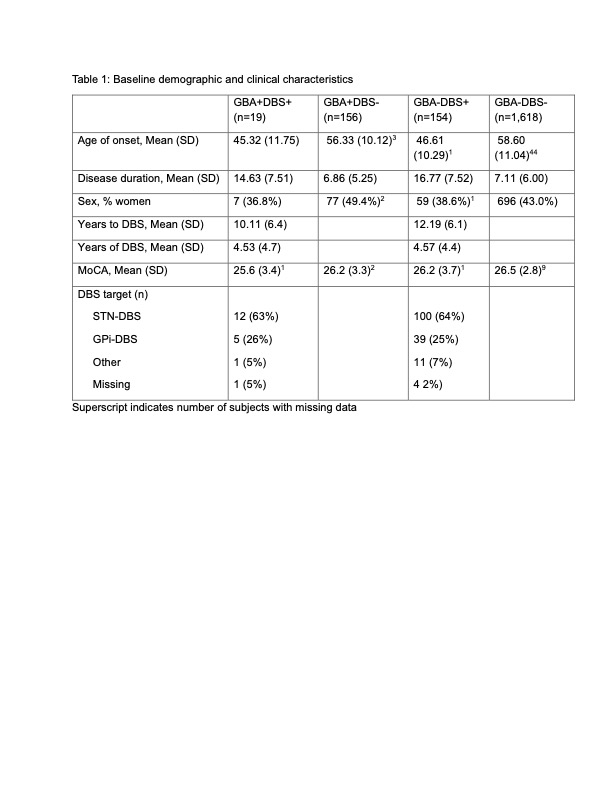Category: Surgical Therapy: Parkinson's Disease
Objective: To compare differences in cognitive complaints in Parkinson’s disease (PD) patients who are GBA1 mutation carriers and non-carriers either with or without DBS.
Background: Studies suggest GBA1 mutation carriers may be susceptible to cognitive deficits post STN-DBS. We investigate this hypothesis using the PD GENEration cohort.
Method: We analyzed data from the clinical phase of PD GENEration, a North American genetic registry study. Genetic and MDS-UPDRS data were available on 1,947 participants. The primary outcome, item 1.1 of the MDS-UPDRS Part I, assessed self-reported cognitive impairment. Secondary outcomes included, item 1.2, evaluated hallucinations and psychosis, and Montreal Cognitive Assessment (MoCA) scores. Outcome scores were categorized as: 0, normal; 1-2, mild symptoms, and 3-4, moderate symptoms. All participants who reported DBS were included, excluding those with both GBA1 and LRRK2 mutations. Participants were categorized as GBA1+DBS+, GBA1+DBS-, GBA1-DBS+, GBA1-DBS-. Ordinal logistic regression compared MDS-UPDRS item 1.1 and 1.2 scores, adjusting for age of onset, disease duration, and sex. Sub-analyses included (1) STN-DBS and (2) GPi-DBS groups. Weighted least squares regression was used to examine the relationship between MoCA scores, the groups of interest, and the covariates described above.
Results: Primary and/or secondary outcome measure data were available on: 19 GBA1+DBS+, 156 GBA1+DBS-, 154 GBA1-DBS+, and 1,618 GBA1-DBS-. Demographic and clinical characteristics are detailed in Table 1. The logistic regression model revealed no difference in item 1.1 (Cognitive Impairment) between groups (all p values > 0.05). The same was true when examining only those with STN-DBS and those with GPi-DBS. Patients in the GBA1+DBS- group had an increased likelihood of reporting hallucinations and psychosis (OR 1.74 [1.0, 2.9], p = 0.036), with no effect of DBS on this outcome.
Conclusion: No differences were found in our primary or secondary outcome measures between groups. Limitations to this study include its cross-sectional design and the small sample size of GBA1 patients with STN or GPi DBS. Larger datasets that combine clinical and genetic data are needed to understand the effects of DBS in genetic subtypes of PD.
Table 1
To cite this abstract in AMA style:
J. Son, K. Ghosh Galvelis, A. Naito, J. Beck, R. Alcalay, G. Pal. PD GENEration: A cross-sectional evaluation of cognitive complaints in Parkinson’s disease (PD) patients according to GBA1 and DBS status [abstract]. Mov Disord. 2024; 39 (suppl 1). https://www.mdsabstracts.org/abstract/pd-generation-a-cross-sectional-evaluation-of-cognitive-complaints-in-parkinsons-disease-pd-patients-according-to-gba1-and-dbs-status/. Accessed December 13, 2025.« Back to 2024 International Congress
MDS Abstracts - https://www.mdsabstracts.org/abstract/pd-generation-a-cross-sectional-evaluation-of-cognitive-complaints-in-parkinsons-disease-pd-patients-according-to-gba1-and-dbs-status/

